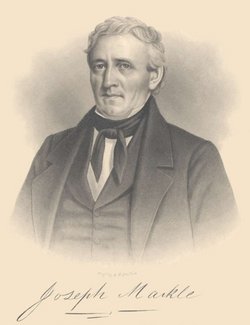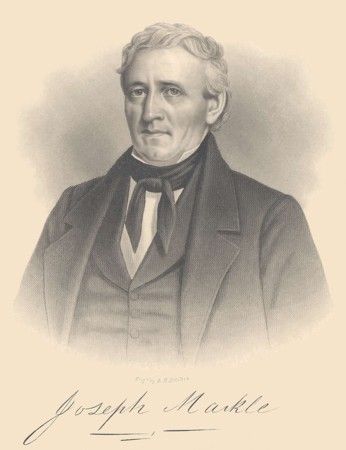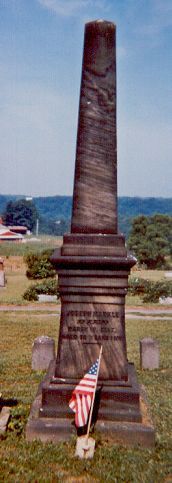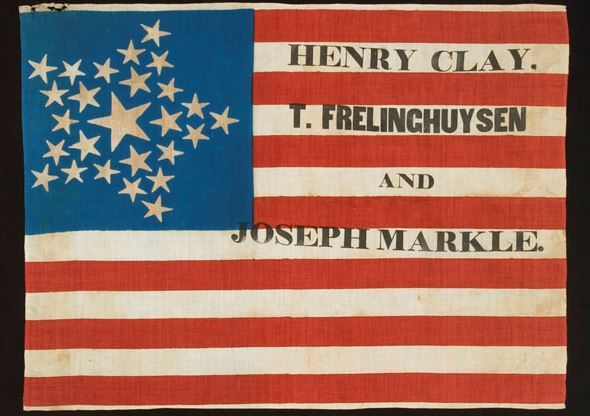In 1811 he abandoned the river trade, and began a partnership with Simon Drum and built a paper mill near West Newton. It was the third mill of that kind west of the Alleghenies. He had barely started this business when the War of 1812 started. He joined in the war and raised a company of cavalry. When they reached Pittsburgh the provisions which were promised them were not at hand. He raised the money by signing his own note for $1,250 and which was endorsed by Joshua Budd, William Fullerton and John Daily. This along with other funds raised enabled the troops to move on to the front. Their services in the war have been briefly detailed by an order made at the close of their enlistment in August 1813.
"The period for which the troops of the Light Dragoons, commanded by Captain Markle, was engaged, being about to expire, the commanding general directs that they proceed to Franklintown for their baggage, and that they be there discharged, or proceed embodied to Pittsburgh before they are discharged, as Capt. Markle may think proper. Gen. Harrison returns Capt. Markle, his subalterns, non-commissioned officers and soldiers, his thanks for their good conduct whilst under his command. In the course of eleven months' service, in which they have performed as much severe duty as any troops ever did, the General has found as much reason to applaud their steady and subordinate deportment in camp as their coolness and valor when opposed to the enemy, both of which were eminently displayed at the battle of Mississinewa and at the siege of Fort Meigs.
A. H. HOLMES. Adjt. General."
After the war, Capt. Markle was elected a major-general of the Pennsylvania Militia for the division composed of Westmoreland and Fayette counties.
He also started to build up his business. He was involved in flour, paper making, farming and store keeping. Due to the war and him being gone the business had suffered. The paper business, under his supervision, grew rapidly, so that they soon supplied the greater part of Western Pennsylvania and were able to ship large quantities to Ohio and Kentucky. In 1829 he turned his business over to his sons and retired.
He was involved in politics and had voted for Thomas Jefferson, Madison, Monroe and John O. Adams. In 1828 he voted for Andrew Jackson, but did not support him in 1832, because he did not agree with him on tariffs. In 1836 and 1840 he supported William Henry Harrison for the presidency. He was a great admirer of Henry Clay and supported him and every other Whig and Republican candidate for the presidency up to the time of his death.
In 1844 he was the Whig candidate for Governor, but was defeated by Francis R. Shunk by a small plurality. Prior to this Markle had been a candidate for Assembly, and in 1838 was a candidate for Congress, but in each instance was a candidate against his wishes. When the Civil war came he was a strong supporter of the Northern cause. When Pennsylvania was threatened with an invasion he raised a company for home defense, and was elected its captain, though he was then over eighty-six years old.
All through out his life he had been an avid reader and had a remarkable memory. His leading characteristics were his courage, his honesty and his benevolence. Particularly he displayed this last quality by visiting his poor neighbors when afflicted, and in supplying them with every necessary comfort.
In 1811 he abandoned the river trade, and began a partnership with Simon Drum and built a paper mill near West Newton. It was the third mill of that kind west of the Alleghenies. He had barely started this business when the War of 1812 started. He joined in the war and raised a company of cavalry. When they reached Pittsburgh the provisions which were promised them were not at hand. He raised the money by signing his own note for $1,250 and which was endorsed by Joshua Budd, William Fullerton and John Daily. This along with other funds raised enabled the troops to move on to the front. Their services in the war have been briefly detailed by an order made at the close of their enlistment in August 1813.
"The period for which the troops of the Light Dragoons, commanded by Captain Markle, was engaged, being about to expire, the commanding general directs that they proceed to Franklintown for their baggage, and that they be there discharged, or proceed embodied to Pittsburgh before they are discharged, as Capt. Markle may think proper. Gen. Harrison returns Capt. Markle, his subalterns, non-commissioned officers and soldiers, his thanks for their good conduct whilst under his command. In the course of eleven months' service, in which they have performed as much severe duty as any troops ever did, the General has found as much reason to applaud their steady and subordinate deportment in camp as their coolness and valor when opposed to the enemy, both of which were eminently displayed at the battle of Mississinewa and at the siege of Fort Meigs.
A. H. HOLMES. Adjt. General."
After the war, Capt. Markle was elected a major-general of the Pennsylvania Militia for the division composed of Westmoreland and Fayette counties.
He also started to build up his business. He was involved in flour, paper making, farming and store keeping. Due to the war and him being gone the business had suffered. The paper business, under his supervision, grew rapidly, so that they soon supplied the greater part of Western Pennsylvania and were able to ship large quantities to Ohio and Kentucky. In 1829 he turned his business over to his sons and retired.
He was involved in politics and had voted for Thomas Jefferson, Madison, Monroe and John O. Adams. In 1828 he voted for Andrew Jackson, but did not support him in 1832, because he did not agree with him on tariffs. In 1836 and 1840 he supported William Henry Harrison for the presidency. He was a great admirer of Henry Clay and supported him and every other Whig and Republican candidate for the presidency up to the time of his death.
In 1844 he was the Whig candidate for Governor, but was defeated by Francis R. Shunk by a small plurality. Prior to this Markle had been a candidate for Assembly, and in 1838 was a candidate for Congress, but in each instance was a candidate against his wishes. When the Civil war came he was a strong supporter of the Northern cause. When Pennsylvania was threatened with an invasion he raised a company for home defense, and was elected its captain, though he was then over eighty-six years old.
All through out his life he had been an avid reader and had a remarkable memory. His leading characteristics were his courage, his honesty and his benevolence. Particularly he displayed this last quality by visiting his poor neighbors when afflicted, and in supplying them with every necessary comfort.
Family Members
Advertisement
Advertisement



















